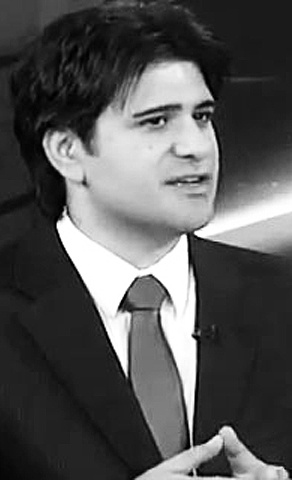"I sincerely believe that you and your organization are doing invaluable work, and putting precious efforts into raising awareness and making sure that children and women have access to basic and most required platform to further their education. I think that your mission and philanthropic work is unique in a sense that it marries education and digital media in developing countries. I hope you continue doing this great work, and I wish you the best."

Majid Rafizadeh, is an American political scientist scholar, policy analyst, expert and commentator on US foreign policy and Middle East.
FA: Can you briefly tell us about yourself and your background?
MR: I am originally from the Islamic Republic of Iran and Syria. I lived most of my life in that area. My father is Iranian and my mother is Syrian. I came to learn about the distinct socio-political, cultural and socio-religious fabric of the so-called Arab and Persian world. I grew up in both Sunni and Shiite societies speaking Arabic and Persian. Later, I came to the United States on Fulbright teaching scholarship and became US citizen. It has been quite a journey.
FA: What inspired you to become a journalist and a human rights activist ?
MR: Honestly, although I have been referred to as journalist, scholar, and human rights activist on TV or radio, I do not call myself a professional journalist or human rights activist. There are many who are much better than me. I only follow my passion in academia and the real world. I can say that, I am - as most of the people- shaped and influenced by the environment that we interact with and have grown up in.
FA: How do you think digital media can change the state of journalism in the Middle East and Afghanistan?
MR: I think digital media has already made significant changes in these societies. Considering journalism, you can almost say, that most of the ordinary people in these nations, are turning into journalists; in a sense that they use different platforms in the social media to tell and show what is happening in their area. First of all, this will make it much harder for the governments to suppress and oppress people. There are gaps as well, not many people still have access to digital media.
But also there are downside to the increasing use of social media. As people are getting more interconnected, and as people in the Middle East are learning more about the Western lifestyle, misunderstandings and misconceptions will emerge if there is no adequate education to address this phenomenon. People's expectation will go higher as they compare themselves with other nations. As a result, those who once felt satisfied with their life, they are feeling now that there is gap between what they have/possess and what they expect to have.
FA: What kind of stories do you mostly cover in your reports and why?
MR: I mostly do scholarly, political analysis, and have been asked by national and international outlets to write policy analysis. But I have also been asked to write about my family stories and those who lost their lives in the Syrian civil war and Iran.
I think the first and most important thing is passion. The second thing is passion. And the third is passion as well. But passion for what? Passion for telling the truth to the people, telling the stories of ordinary people whose names are not in newspapers or on TV.
FA: What would be your advice for young Afghans who want to pursue a career in journalism?
MR: Most fundamentally, passion for telling the truth without seeking publicity for one's own self interest. It should not be about YOU, it should be about people and revealing the facts. Unfortunately some are doing this profession in order to draw attention to themselves, become in the center of spotlight, and probably signs contracts worth of millions of dollars later as famous TV host, etc.
After passion, I think learning about the fundamental rules and ethics of journalism is crucial.
FA: What is your impression about the work of Women's annex Foundation and its role in Digital Literacy in Afghanistan and South Asia?
MR: I sincerely believe that you and your organization are doing invaluable work, and putting precious efforts into raising awareness and making sure that children and women have access to basic and most required platform to further their education. I think that your mission and philanthropic work is unique in a sense that it marries education and digital media in developing countries. I hope you continue doing this great work, and I wish you the best.
Subscribe to my blogs and Women's Annex so you don't miss the next articles.



